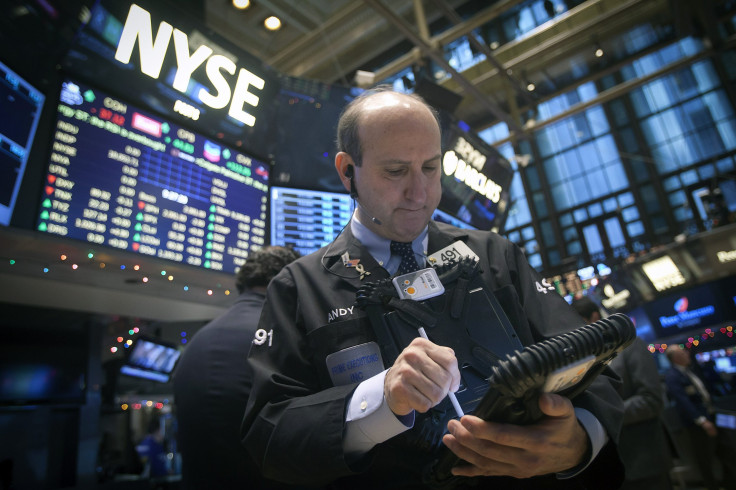Dow Jones Industrial Average Wavers As Oil Prices Tumble To 5-Year Low

U.S. stocks fell Tuesday after the Dow Jones Industrial Average snapped a seven-day winning streak the previous session, as tumbling oil prices continued to weigh on investor sentiment, with global prices falling to five-year lows. The Dow, which measures the share prices of 30 large industrial companies, fell 53.17 points, or 0.29 percent, to 17,985.06; the S&P 500 stock index dropped 6.31 points, or 0.30 percent, to 2,084.26. The tech-heavy Nasdaq Composite declined 16.20 points, or 0.33 percent, to 4,806.91.
Brent crude, the global benchmark for oil, fell to a five-year low of less than $57 a barrel on Tuesday, its lowest level since May 15, 2009, in overnight trading. In morning trading, Brent crude declined 0.31 percent Tuesday to $57.70 a barrel, for Feb. 15 delivery, on the London ICE Futures Exchange. Meanwhile, U.S. crude oil closed at its lowest value since May 2009 on Monday, losing more than 50 percent since it touched a 52-week high of $107.26 in June. West Texas Intermediate crude, the benchmark for U.S. oil prices, added 0.04 Tuesday to reach $53.63 per barrel, for Feb. 15 delivery, on the New York Mercantile Exchange.
The current fall in energy prices has a positive aspect for the U.S., according to Peter Cardillo, chief market economist at Rockwell Global Capital. “One positive, for corporate America, lies in the fruits of growing economic activity," Cardillo said in a note. "In other words, lower cost factors act to increase profits.”
As the U.S. gets set to ring in 2015, equity markets are poised to end 2014 at record highs. Year to date the Dow, S&P 500 and Nasdaq have advanced 9 percent, 13 percent and 15 percent, respectively.
“A pickup in hiring, continued deleveraging and a rise in asset prices have helped to restore confidence domestically,” Chad Morganlander, portfolio manager at Washington Crossing Advisors, said in a research note Tuesday.
Data Tuesday showed consumer confidence improved in December after declining the previous month. The index of consumer attitudes rose to 92.6, up from 91.0 in November, the Conference Board’s Consumer Confidence Index showed. Analysts had expect the index to rise to 93 in December, according to analysts polled by Thomson Reuters.
Consumer confidence rebounded modestly in December, propelled by a considerably more favorable assessment of current economic and labor market conditions. The Conference Board’s Present Situation Index, currently at 104.0, is now at its highest level since February 2008, while the Expectations Index fell to 88.5 from 89.3 in November.
“Consumers were moderately less optimistic about the short-term outlook in December, but even so, they are more confident at year-end than they were at the beginning of the year,” Lynn Franco, director of Economic Indicators at the Conference Board, said in the report.
Separate data showed U.S. single-family home prices slowed in October, following the stronger-than-expected rise in prices the previous month. Home prices recorded a 4.6 percent annual gain in October vs. 4.8 percent in September, according to the S&P/Case-Shiller U.S. National Home Price Index, which covers all nine U.S. census divisions.
© Copyright IBTimes 2024. All rights reserved.





















